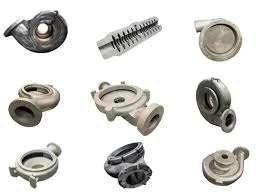Mobile:+86-311-808-126-83
Email:info@ydcastings.com
Optimizing Oil Flow Efficiency with Advanced Impeller Design Techniques
Understanding Oil Impellers A Key Component in Fluid Dynamics
Oil impellers play a crucial role in various industrial applications, particularly in the realm of fluid dynamics. Their primary function is to transfer energy to a fluid, which facilitates efficient movement and improved performance in systems where oil is a critical medium. This article will delve into the purpose, design, and applications of oil impellers, highlighting their significance in modern engineering.
An oil impeller is essentially a rotating component that is used to generate flow and pressure in fluids, predominantly oils. They operate on the principle of converting rotary motion into fluid motion, which is achieved through their specific design, characterized by blades or vanes that extend outward from a central shaft. When the impeller rotates, the blades push the fluid outward, creating a pressure differential that draws more oil into the system. This process is vital for ensuring that lubrication systems work efficiently, thereby enhancing the performance and longevity of machinery.
The design of oil impellers varies depending on the specific application and fluid properties. Engineers must consider factors such as viscosity, flow rate, and the operating environment when selecting or designing an impeller. Common materials used for oil impellers include stainless steel, aluminum, and various engineered plastics. These materials are chosen for their strength, corrosion resistance, and ability to withstand the high temperatures often associated with oil-based systems.
oil impeller

One prominent application of oil impellers is in automotive engines. In these systems, oil impellers help circulate lubricating oil, ensuring that all moving parts receive adequate lubrication. This reduces friction, minimizes wear and tear, and ultimately enhances the overall efficiency of the engine. Similarly, oil impellers are vital in hydraulic systems, where they facilitate the movement of hydraulic fluids that power equipment and machinery.
Beyond automotive and hydraulic applications, oil impellers also find their place in various industrial processes, such as oil extraction and refining. In these settings, impellers are used to move fluids through complex networks of pipes and systems, ensuring efficient separation, mixing, and transport of oil products. The efficiency of these processes directly impacts production rates and operational costs, proving the importance of effective oil impeller design.
Moreover, advancements in technology have led to the development of more sophisticated oil impeller designs that enhance performance and energy efficiency. Computational fluid dynamics (CFD) simulations allow engineers to analyze and optimize impeller designs, resulting in improved fluid flow characteristics and reduced energy consumption.
In conclusion, oil impellers are indispensable components in numerous industries, ensuring efficient fluid movement and system performance. Their ability to convert rotary motion into fluid flow has wide-ranging applications, from automotive engines to industrial processes. As technology continues to advance, the future of oil impellers looks promising, with potential enhancements that could lead to even greater efficiencies in fluid dynamics. Understanding their design and function is essential for engineers and industry professionals alike, as they strive to improve the systems that rely on these critical components.
-
Valve Body Acts as the “Heart” of Flow ControlNewsMay.19,2025
-
Understanding the Importance of ImpellersNewsMay.19,2025
-
Importance of Automobile Water PumpsNewsMay.19,2025
-
How an Engine Oil Pan Works to Keep Your Car LubricatedNewsMay.19,2025
-
Common Materials Used in Pump Impeller ManufacturingNewsMay.19,2025
-
Ball Valve Casting in Modern Pipeline SystemsNewsMay.19,2025











